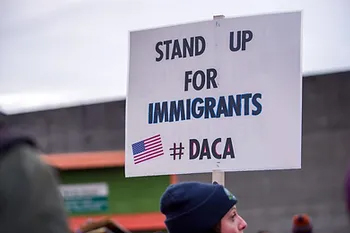By: Eli Verschleiser
We are in the process of a rigorous national debate on immigration in this country, and that is a positive, healthy process.
With notable exceptions in some corners who have sadly become very strident lately, most Americans recognize that open doors to new Americans, with new skills and ideas is a bedrock of our democracy.
At the same time, we can’t turn a blind eye to those who break the law by violating our borders. It’s unfair to legal immigrants, costly to states and municipalities and does not allow us to identify criminals, terrorists, the contagiously ill or fugitives from trouble in other countries. Some reform of legal immigration, including the refugee process, is also necessary.
I’m confident that a fair comprehensive reform will emerge from this debate that will keep our borders guarded but open and allow enforcement agents to concentrate where they are most needed: stopping or deporting dangerous people.
That’s one of the purposes of the Deferred Action for Childhood Arrivals program that President Trump, faced with lawsuits from states on both sides of the issue, has discontinued, calling on Congress to enact a similar law as part of a reform package.
DACA’s pending refusal of new applications puts some 800,000 eligible young people ages 15-36 in danger of deportation.
While President Barack Obama’s process for putting this policy in place via executive action was flawed (and in the eyes of many a blatant effort to shore up his political base for the 2102 election), the motive and reasoning behind it is solid.
For one thing, children who had no say in illegally entering or remaining in this country, and who have known no other place to live and may not even speak the language of their homeland, are at no fault of their own and should be allowed to stay, not suffer for their parents’ crime.
Especially not when they are living productively, getting an education, working and paying taxes, or serving in the military. The protection does not apply, obviously to “people convicted of a felony, significant misdemeanor, or three or more other misdemeanors, and do not otherwise pose a threat to national security or public safety,” as stated in the guidelines. It also does not apply to people in the process of deportation proceedings.
Further, deporting DACA eligible young people, an estimated 90 percent of whom are employed, will cost us as much as $2 billion in lost taxes, according to the Institute for Taxation and Economic Policy. That’s in addition to court and other costs for unnecessary enforcement and deportation proceedings, estimated at $10 billion, while tying up agents who could and should be breaking up terror cells, violent gangs or drug smuggling rings.
DACA does not automatically provide a citizenship stamp or even a green card: Just protection that must be renewed every two years.
According to the New York Times, President Trump said he was acting on behalf of “the millions of Americans victimized by this unfair system.” Attorney General Jeff Sessions said the program had “denied jobs to hundreds of thousands of Americans by allowing those same illegal aliens to take those jobs.”
As far as the jobs argument is concerned, unemployment is at a record low, and we shouldn’t assume the 4.4 percent who remain unaffected by job growth, of mixed ages, have been denied because of these immigrants, and that they will have the training and other capabilities to take those jobs opened by deportation.
Some say DACA provides an incentive for people to come here illegally with children. That may be true if permanently implemented, but under the current program it only applies to people who have been continuously resided in the United States since June 15, 2007, not future arrivals.
Speaking to CNN on Sunday (9/10), Republican Sen. John McCain of Arizona called for a “comprehensive” immigration reform that gives priority to keeping those engaged in Science Technology Engineering and Math (STEM) careers, while keeping borders secure. He said it is not “conscionable to tell young people who came here as children that they have to go back to a country that they don’t know,” in particular the estimated 900 DACA-eligible members of the armed forces.
Hopefully a majority of his colleagues in Congress will agree, but with numerous debates looming over tax reform and the budget and federal relief for storm damages taking priority it will be an uphill battle to make any progress on immigration before March, when the program effectively ends.
We have adopted some backward policies and laws, creating years of non-sensible red tape. Immigration needs to be reformed from the ground up. But kicking these Dreamers out goes against the core of who we are as Americans. Their only “fault” is that their parents wanted to achieve a better life, a better hope, and a better future for them, and that’s why they have been labeled “Dreamers” — they embody the ideal of the American Dream.
They are not so different from my grandparents who immigrated to America from Europe pursuing dreams of their own, namely the dream of thriving without the threat of religious persecution. America has always been a beacon for such people.
But deporting dreamers will dim that beacon. As the Wall Street Journal observed, rescinding DACA betrays those who, encouraged by the government, provided personal identification and records to apply for the program. “These young immigrants have committed no crime and trusted the federal government to protect them.”
Congress must act to prevent punishment of those who committed no crime.
At a time when we are struggling with our international image, the last thing we need is to become known as a land of broken promises, and broken dreams.
About the author:
Eli Verschleiser is a financier, real estate developer, and investor in commercial real estate. In his Philanthropy, Mr. Verschleiser is on the board of Trustees for the American Jewish Congress, Co-Founder of Magenu.org, & President of OurPlace, a non-profit organization that provides support, shelter, and counseling for troubled Jewish youth.
Mr. Verschleiser is a frequent commentator on political and social services matters.
Follow on Twitter: @E_Verschleiser



